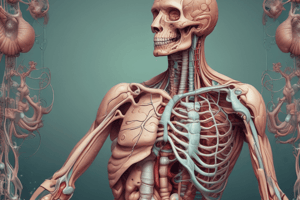Podcast
Questions and Answers
What role does the large intestine play in the absorption of sodium?
What role does the large intestine play in the absorption of sodium?
- Sodium absorption does not occur in the large intestine.
- Sodium is actively absorbed followed by passive absorption of chloride. (correct)
- Sodium is eliminated without absorption.
- Sodium is absorbed osmotically dependent on water.
Which of the following best describes the mucosa of the large intestine?
Which of the following best describes the mucosa of the large intestine?
- Contains extensive villi to enhance absorption.
- Lacks villi and has more goblet cells for mucus secretion. (correct)
- Thinner mucosa with fewer goblet cells.
- Only absorbs nutrients and not water.
What is the primary formation of fecal matter in the large intestine?
What is the primary formation of fecal matter in the large intestine?
- 400 ml of fluid is absorbed.
- 450 ml enters daily and all is absorbed.
- 200 ml of fluid is eliminated daily.
- 350 ml of water is absorbed from 500 ml of fluid entering the colon. (correct)
What are haustra in the context of the large intestine?
What are haustra in the context of the large intestine?
Which component primarily serves the function of lubrication in the large intestine?
Which component primarily serves the function of lubrication in the large intestine?
What is the main reason water is absorbed in the large intestine?
What is the main reason water is absorbed in the large intestine?
What distinguishes taeniae coli from the circular smooth muscle layer in the large intestine?
What distinguishes taeniae coli from the circular smooth muscle layer in the large intestine?
How much fluid is typically eliminated daily from the large intestine?
How much fluid is typically eliminated daily from the large intestine?
What is the characteristic feature of the luminal surface of the large intestine?
What is the characteristic feature of the luminal surface of the large intestine?
What kind of food residues are primarily delivered to the large intestine?
What kind of food residues are primarily delivered to the large intestine?
What is one of the principal components of the large intestine?
What is one of the principal components of the large intestine?
Which part of the large intestine is known as the blind-ended pouch?
Which part of the large intestine is known as the blind-ended pouch?
How much chyme does the colon typically receive per day from the small intestine?
How much chyme does the colon typically receive per day from the small intestine?
What structure is formed when the terminal part of the colon straightens out?
What structure is formed when the terminal part of the colon straightens out?
Which muscle type makes up the internal anal sphincter?
Which muscle type makes up the internal anal sphincter?
What role does the large intestine primarily serve in digestion?
What role does the large intestine primarily serve in digestion?
What unique feature is associated with the structure of the colon?
What unique feature is associated with the structure of the colon?
What is the primary purpose of the gastrocolic reflex?
What is the primary purpose of the gastrocolic reflex?
What is a key symptom associated with constipation?
What is a key symptom associated with constipation?
What condition is characterized by the absence of nerve cells in part of the large intestine?
What condition is characterized by the absence of nerve cells in part of the large intestine?
Study Notes
Large Intestine Structure
- The large intestine consists of the colon, cecum, appendix, and rectum.
- The cecum is a blind-ended pouch below the junction of the small intestine and the large intestine at the ileocecal valve.
- The appendix is a finger-like projection at the bottom of the cecum containing lymphoid tissue.
- The colon comprises most of the large intestine and consists of three straight portions: ascending, transverse, and descending colon.
- The terminal part of the descending colon becomes S-shaped, forming the sigmoid colon.
- The sigmoid colon straightens out to form the rectum.
Large Intestine Role
- The large intestine receives approximately 500 ml of chyme per day from the small intestine.
- The major role of the large intestine is drying the intestinal contents and storage.
- The large intestine absorbs water and salt.
- Sodium is actively absorbed, and chloride passively follows. Water follows osmotically.
- The large intestine forms firm fecal matter.
Large Intestine Contents
- The contents delivered to the large intestine include indigestible food residues (cellulose), unabsorbed biliary compounds, and some fluid.
- The luminal surface of the large intestine is smooth and has a low absorptive capacity.
Large Intestine Histology
- The large intestine mucosa lacks villi and only absorbs water.
- The mucosa of the large intestine is thicker.
- Its crypts are deeper with more goblet cells, which secrete mucus for lubrication and protection from colon contents.
Haustral Contractions
- The outer longitudinal smooth muscle of the large intestine does not completely surround it.
- It consists of three separate bands of muscle called taenia coli.
- The taenia coli are shorter than the underlying circular smooth muscle layer, causing the large intestine to bunch up and form pouch-like sacs called haustra.
Studying That Suits You
Use AI to generate personalized quizzes and flashcards to suit your learning preferences.
Related Documents
Description
Explore the structure and functions of the large intestine, including the colon, cecum, appendix, and rectum. Understand the role of the large intestine in absorbing water and salts, as well as its overall function in digestion and waste formation.




